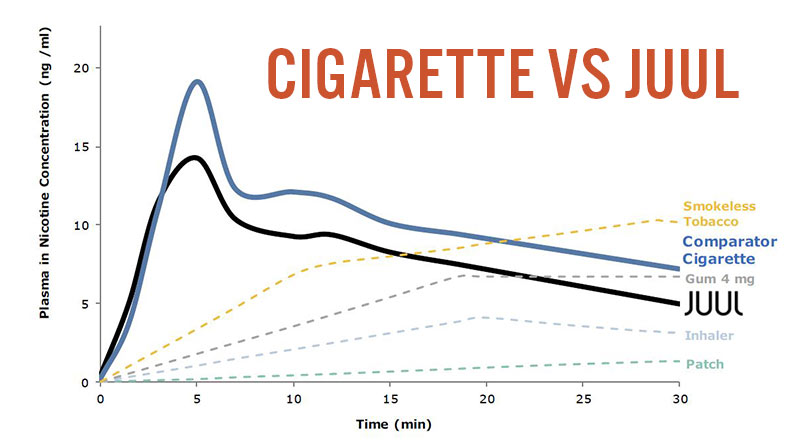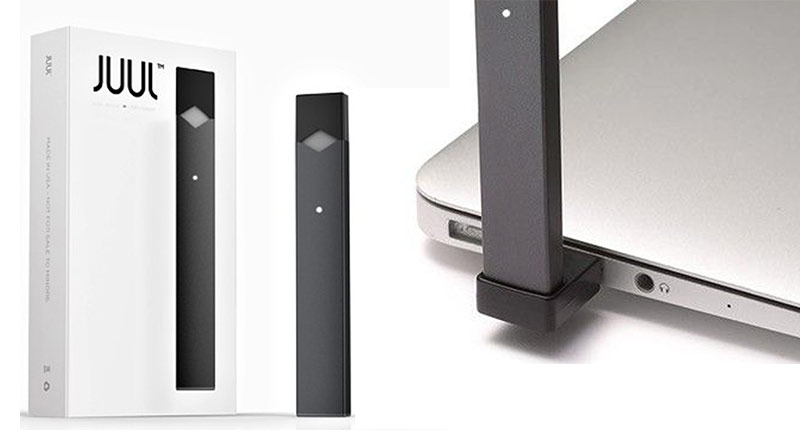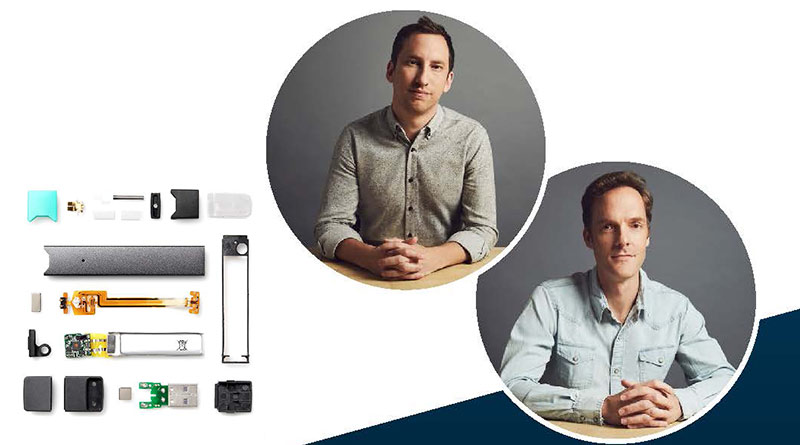With Its Technology Imitating Cigarettes, JUUL Looks Forward To Some Real Success In Quebec
Rarely have we seen such a success in the U.S. but what most people don’t know is that there is a scientific reason behind it.
It’s not just the marketing, nice design, cool name or buzz, even though all these factors have probably helped a lot.
It’s mainly because JUUL (pronounce ‘jewel’) is the first e-cigarette that truly reproduce the levels of nicotine intake obtained by smoking a real cigarette.
In other words, it’s the first quite real smokeless cigarette!
For smokers, it makes a world of difference. For them, it means obtaining satisfaction without tobacco combustion, only from vapor… which is of course far less harmful than real smoke.

A demand based on nicotine
In the United States, JUUL is so successful that it alone accounts for 76% of vaping products sales.
Based in San Francisco, the company’s growth resembles that of internet startups. Since its 2015 product launch, the value of the company has risen to US$16 billion. And, proof of the product notoriety, JUUL has now become part of everyday vocabulary.
In Canada, it made its entry shortly after the Federal government passed Bill S-5 which finally allows the sale of nicotine fluids, the key ingredient looked for by vapor enthusiasts.
For some public health advocates, JUUL‘s success is kind of worrying since it may encourage minors or nonsmokers to start consuming nicotine.
However, many — including several well-known Physicians and Specialists as well as Health Canada — see it as a wonderful opportunity to convert adult smokers from tobacco combustion to vapor.
And that’s exactly what JUUL’s mission is about: to convert smokers — not minors — to the less harmful option of vapor.

C-store owners can therefore contemplate the possibility of selling a product that, for once, is endorsed by the health authorities and even Health Canada, as long as it is kept away from minors.
But the question remains: how to achieve a breakthrough here in Quebec where regulations is banning any in-store visibility and promotion? And also, despite the fact that depanneurs have had a disappointing experience with this product category so far?
To dig more into these issues, we conducted an interview with JUUL Labs key executive in Canada, Michael Nederhoff.
Interview with Michael Nederhoff, General Manager of JUUL Labs Canada.
DepQc: Mr. Nederhoff, thank you for accepting this interview with DepQuébec. What is the key element, in your opinion, that is behind JUUL’s popularity among U.S. consumers?
MN: Cigarettes are one of the world’s biggest public health concerns, killing over 50% of their long-term users. JUUL’s founders, James and Adam, were both smokers, and they wanted to design a product that was as satisfying as a cigarette without the harmful combustion. JUUL’s popularity comes from the fact it satisfies the same cravings as traditional cigarettes. Other vape devices had some limited success, but ours was the first designed from the ground-up to satisfy the cravings of a smoker without the combustion.
DepQc: Do you believe JUUL’s huge success will repeat in Canada?
We certainly hope so! We want to impact the lives of adult smokers by providing them with a satisfying alternative to combustible cigarettes. All smokers, all over the world, deserve the chance to free themselves from the burden of traditional tobacco, and the chance to change their lives. — Michael Nederhoff, JUUL Labs Canada
DepQc: What are your ambitions towards the Quebec market?
MN: Quebec has one of the highest smoking rates in Canada, and all of the negative effects that cigarette consumption brings. Because of this, we think that it is one of the places where we can have the most impact on people’s lives. But this is a challenge as well, because the law in Quebec currently does not allow vapor products to brand or advertise in-store – or even to sell online, which is a restriction no other province has in Canada. We think this is a missed opportunity, because the best time to educate current smokers is where and when they are purchasing their cigarettes.

DepQc: Why should Quebec c-store owners start considering and selling your products?
MN: Our customers, just like their customers, are looking for products that can help them switch from combustible cigarettes. I think it’s always a good idea to give customers what they want!
C-store owners are also great partners because in both Quebec and across Canada they have an excellent track record of age verification, which is of course an incredibly important part of retailing an age-restricted product. — Michael Nederhoff, JUUL Labs Canada
DepQc: In Quebec, over the past 10 years, c-store owners have had a bad experience with the e-cig category. They were once allowed to showcase vape products but were banned to sell any nicotine, which led to poor sales. Then, they recently became allowed to sell nicotine but are now banned to promote or showcase any vape product. Do you think JUUL’s addition to their product line-up can successfully transform this dynamic?
MN: We absolutely hope so — and we hope the Quebec government can see the benefit of moving traditional burned tobacco smokers to vapor products like JUUL, just like Health Canada has already done. But of course this is only possible if there is trust – trust in the category, and trust in the retailers – to keep the product out of the hands of underage consumers.
DepQc: How do you see the Quebec e-cig category in the next 5 to 10 years?
MN: If it’s anything like our other markets, we will see the category mature very quickly, and take share from the traditional cigarette category. This is absolutely our goal.
DepQc: If a c-store owner is interested in selling your products, what should he do?
MN: He can always get in touch with us through this email address: [email protected].
DepQc: Mr. Nederhoff, thank you.






